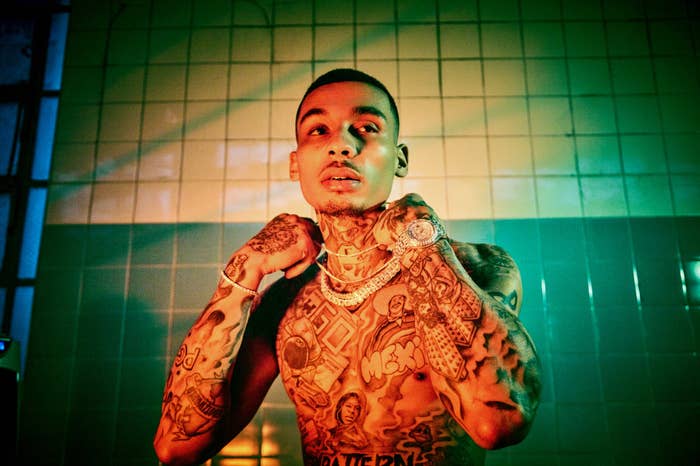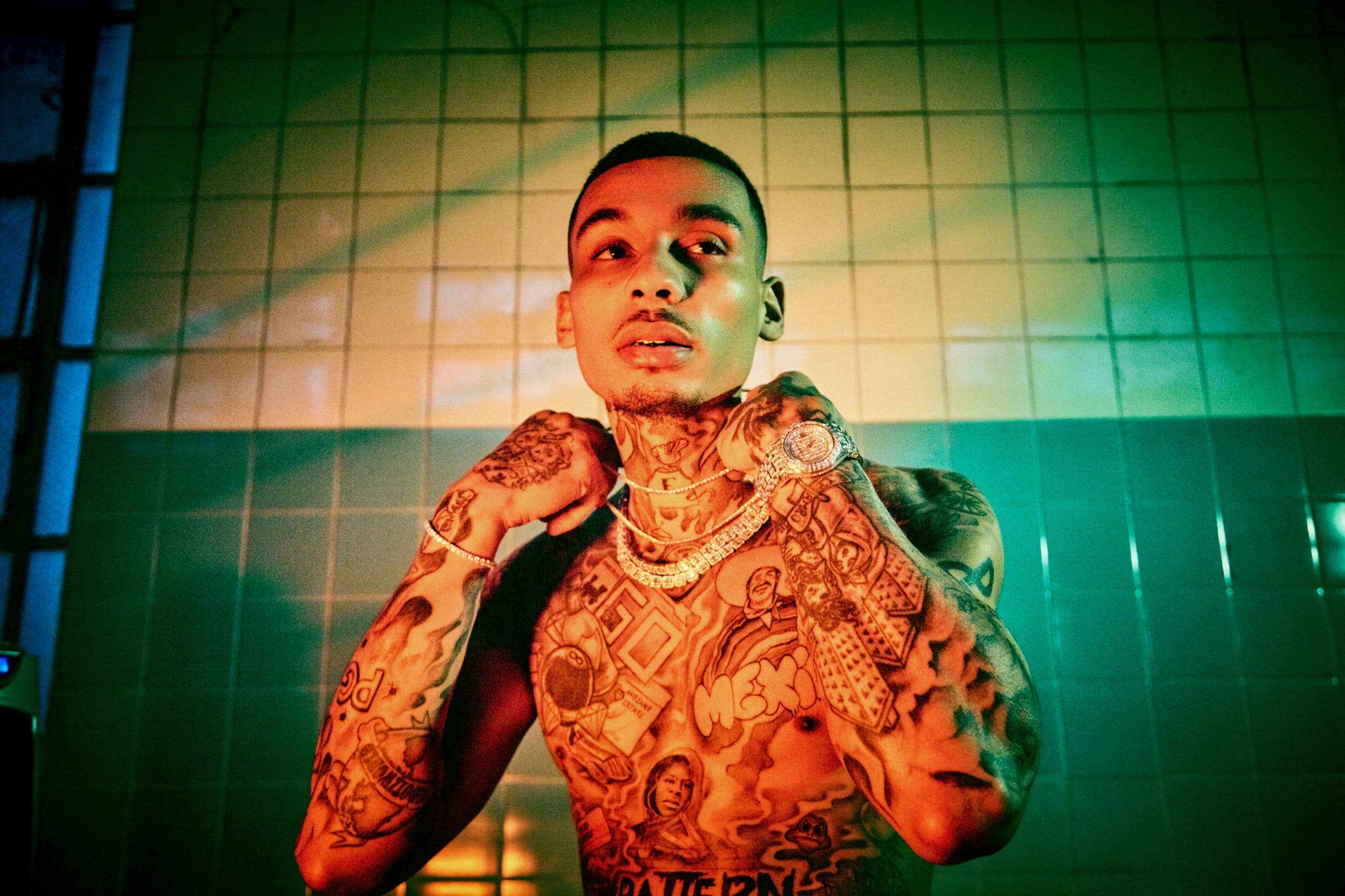
Away from his larger projects, West London-born rapper Fredo has spent much of the last few years in and out of the charts with tracks such as “Ay Carumba” with Young T & Bugsey, “Funky Friday” with Dave, and “So High” with Mist. It was a formula that seemed to be working well for him: draw them in with the pop hits and then get them hooked on the album. However, that seems to be behind him now and he was the first to admit that the most recent of those pop offerings, “Hickory Dickory Dock”, was a step too far.
That frustration, that desire to get back to the real Fredo, is where we pick up our tale today. If there’s an overarching theme on Money Can’t Buy Happiness, his second studio album, it’s that the Fredo who stands before us in 2021 has done a lot of growing up, and with that comes a level of self-awareness that can only be reached after years of life experience and, crucially, missteps. But make no mistake: Fredo is far from wounded. Quite the opposite: he sounds energised and invigorated. If his problem before now was being surrounded by the wrong people, calling on Dave to act as executive producer was a sage decision.
Both Dave’s friendship and his understanding of production have given Fredo a) the benefit of honest opinions, and b) a cohesive album with a consistent vision and tone. With that in place, the four features—Summer Walker, Pop Smoke, Young Adz and Dave—became supplementary rather than the main attraction. Fredo’s projects have always been light on guest features so opting to get such A-listers on the LP might have been a risk, but it’s one that has paid off.
Our first impressions review of Money Can’t Buy Happiness is after the jump.
We asked for the old Fredo, and that’s exactly what we got
Fredo’s May 2020 drop, “Hickory Dickory Dock”, never should have happened and he knows it. “I don’t even know why I did that,” he said on Instagram Live. “I must have just been too high and tried to do something different.” We stan an artist who can admit to their wrongs because that’s exactly what this song was: wrong in more ways than one, starting with the nursery-style rhyme scheme. The single was removed from streaming platforms a month after it was released. In that same IG Live, Fredo explained that he was done with the “pop stuff”—also referring to his collabs with Young T & Bugsey and Mist—and that he’ll prove it to fans with the next album. Like a true hood gent, he has stuck to his word: there’s none of that “Hickory Dickory” rubbish here—the old Fredo’s back in full effect with the hand of exec-producer Dave helping to sharpen his improved artistry that we saw glimpses of when his much-praised Daily Duppy freestyle dropped back in August. —Joseph ‘JP’ Patterson
The flow game has tightened up
If there was one knock on Fredo’s lyrical prowess up to this point, it was probably his reliance, almost to a fault, on the flows and delivery he’s become known for. This has undoubtedly been part of what’s made him one of UK rap’s premier acts, so you can’t knock it too tough. But with cruise control, complacency can creep in, and 2019 project Third Avenue ran the risk of his raps becoming repetitive as he left certain aspects of his artistry unexplored. He must have heard the keyboard warriors murmuring because he sounds rejuvenated on this new album. One thing that immediately sticks out on Money Can’t Buy Happiness is Fredo’s newfound hunger: with tighter and more determined flows, he is punchier in his delivery, condensing his wordplay closer to the pocket of the beat. The pre-released “Back To Basics” stands as one of the project’s very best; Fredo tap-dances over Dave’s absorbing instrumental, especially in the mid-section flow switch up, with what feels like a new level of confidence. Maybe working closely with Santan has rubbed off on him for the better, strengthening his delivery to drive home his messages. Elsewhere, on the more emotion-driven content packing the project (“Biggest Mistake”, “I Miss”, “Aunty’s Place”), Fredo is able to emphasise his hardships, his come-up and the obstacles he has had to face with more potency. —Yemi Abiade
Alongside the standard drip talk is some real, from-the-heart songwriting
Fredo’s storytelling ability was on full display in his Daily Duppy freestyle, and he taps into this further throughout Money Can’t Buy Happiness, elevating the project in the process. Not wasting a bar, it goes without saying that we were going to get flashy nods to his drip and the wealth he’s attained, plus customary street life musings, but he also lets us into his psyche as both a man and an artist as he navigates through life as one of the UK’s top rappers. He peels back the layers with every song, revealing how the sins of his past life currently affect him, leaving him struggling to trust people, but also how it’s affected those around him—whether they be dead or in prison. He gives us an insight into his upbringing, how he was connected to Dave before he even met him, and the reality of becoming a father for the first time. We get a more personal and introspective Fredo than we ever have before, and the album is all the better for it. By the end of it, we know more about Marvin Bailey and not just through his eyes, as well-placed skits give us more of an understanding from a different point of a view. His best outing yet, Fredo has levelled up on multiple accounts. —Aaron Bishop
Dave’s touch on this album is evident
After connecting in 2018 for their No. 1 smash “Funky Friday”, Fredo and Dave have reunited, putting the Streatham rapper in the executive producer chair—a position he’s more than earned given the execution of Psychodrama. Don’t expect much in the way of light-hearted chart fodder, because we are so very far from that territory. Fredo’s playful boasts still creep in every now and again, but you’re unlikely to find any pre-party jams here. Instead, as opener “Biggest Mistake” makes clear, the tone is far more confessional. Dave also produced the bulk of the actual beats—with contributions also coming from Da Beatfreakz, Kyle Evans, Arkzbeatz, Mojam, MJ, Dukus, RicoRunDat, Yoz Beatz and Kirk Beats—and it’s given the album a dark, brooding rap sound that has more than a hint of drill’s influence in its sliding bass and bleak atmospherics. As we saw with Psychodrama, Dave’s biggest strength is his ability to cut through facades (including his own) to get to the core of what defines a person. It was literally the entire set-up for his own album and he’s done well to bring that same approach to Money Can’t Buy Happiness. Fredo’s been hinting at this side of him ever since breakout hit “Changes”, but it’s always been Trojan Horsed in upbeat packages, disguised as the usual street bravado. But with Dave at the helm, all of that falls away and the use of choir motifs—which reach their apex with the use of the same elements that the Fugees’ “Ready Or Not” lifted from The Delfonics’ “Ready Or Not” and Enya’s “Boadicea”—makes for a downright haunting listen. Even “Burner On Deck” with Young Adz and the late Pop Smoke—which will work well in clubs, there’s no denying that—has a thick veil of darkness about it. —James Keith
Fredo is comfortable with being an artist now
Fredo’s debut mixtape, 2017’s Get Rich Or Get Recalled, had plenty of heat for the streets and carved out his credentials as a rapper who could really spit, yet for the most part its formula was straightforward. 2019 debut album Third Avenue was solid, but its powerful conclusion hinted at the heights his music could reach, and this is what makes Money Can’t Buy Happiness such an impressive listen. Fredo’s authenticity has never been in doubt, and on this project he’s coupled it with genuine artistry. It’s too simplistic to put that solely down to Santan Dave’s influence on the buttons; it feels like Zart’s finest has put more distance between himself and the roads, giving him space to grow artistically. Fredo’s second studio album is perfectly balanced between flexing and introspection. MCBH opener “Biggest Mistake” is a carefully crafted piece of street storytelling; the luxurious vibe of lead single “Back To Basics” is elevated by melodic flourishes in his delivery; he cruises smoothly into Auto-Tuned trap-wave territory on “Do You Right” and “Burner On Deck”; explores survivors’ guilt with maturity over the mournful keys of “Blood In My Eyes”, and goes on to poetically grieve for his fallen soldiers on “What Can I Say”. Nothing feels forced or out of place. Living the life that Fredo’s lived means a tension between music and street life will always exist, but MCBH is the work of a young man comfortable in his role as an artist. —Robert Kazandjian
Overall thoughts
It’s clear that Fredo took time out to perfect his craft for this album. Where his previous projects presented a street hustler who could rap—now, he wants to be taken seriously as a lyricist (much like his good friend, Dave) and Money Can’t Buy Happiness does well to open the conversation for this to become a reality. —Joseph ‘JP’ Patterson

